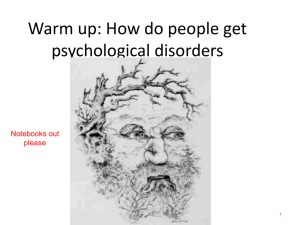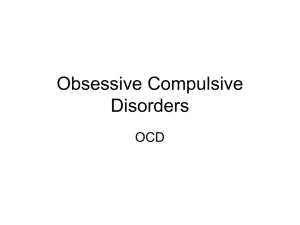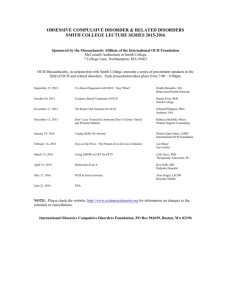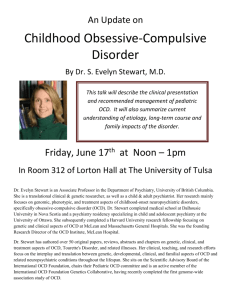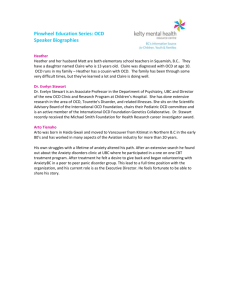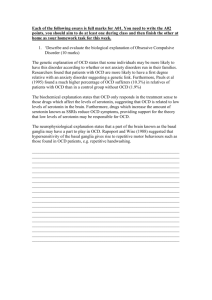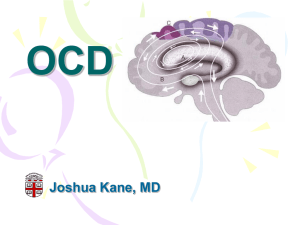Helpful Reading - Central New York Obsessive Compulsive
advertisement
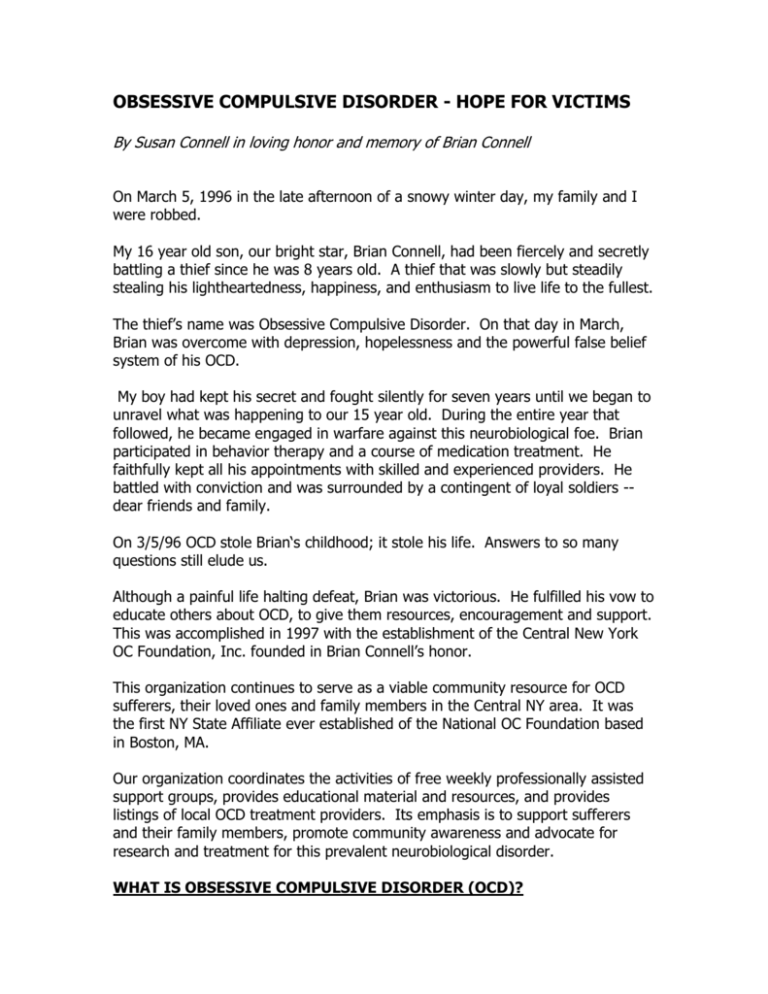
OBSESSIVE COMPULSIVE DISORDER - HOPE FOR VICTIMS By Susan Connell in loving honor and memory of Brian Connell On March 5, 1996 in the late afternoon of a snowy winter day, my family and I were robbed. My 16 year old son, our bright star, Brian Connell, had been fiercely and secretly battling a thief since he was 8 years old. A thief that was slowly but steadily stealing his lightheartedness, happiness, and enthusiasm to live life to the fullest. The thief’s name was Obsessive Compulsive Disorder. On that day in March, Brian was overcome with depression, hopelessness and the powerful false belief system of his OCD. My boy had kept his secret and fought silently for seven years until we began to unravel what was happening to our 15 year old. During the entire year that followed, he became engaged in warfare against this neurobiological foe. Brian participated in behavior therapy and a course of medication treatment. He faithfully kept all his appointments with skilled and experienced providers. He battled with conviction and was surrounded by a contingent of loyal soldiers -dear friends and family. On 3/5/96 OCD stole Brian‘s childhood; it stole his life. Answers to so many questions still elude us. Although a painful life halting defeat, Brian was victorious. He fulfilled his vow to educate others about OCD, to give them resources, encouragement and support. This was accomplished in 1997 with the establishment of the Central New York OC Foundation, Inc. founded in Brian Connell’s honor. This organization continues to serve as a viable community resource for OCD sufferers, their loved ones and family members in the Central NY area. It was the first NY State Affiliate ever established of the National OC Foundation based in Boston, MA. Our organization coordinates the activities of free weekly professionally assisted support groups, provides educational material and resources, and provides listings of local OCD treatment providers. Its emphasis is to support sufferers and their family members, promote community awareness and advocate for research and treatment for this prevalent neurobiological disorder. WHAT IS OBSESSIVE COMPULSIVE DISORDER (OCD)? OCD is a common affliction. It is the 4th most common psychiatric disorder, and is twice as prevalent as panic disorder and schizophrenia. OCD is part of a group of mental disorders which includes Tourettes syndrome, trichotillomania (compulsive hair pulling) and body dysmorphic disorder. It’s estimated that more than 7 million Americans have OCD. It affects all age groups, men, women and children. 1 in 40 adults and 1 in every 200 children are afflicted… slightly more common amongst boys than girls, and has been diagnosed in children as young as two years old. It must be noted that much progress has been made in research, diagnosis and treatment of this anxiety disorder since Dr. Judith Rappaport authored The Boy Who Couldn’t Stop Washing and the release of the movie As Good As It Gets. Increased media coverage of this mental illness has encouraged more people to seek help sooner than in years past when it was typical for sufferers to pursue an accurate diagnosis for an average of 17 years. OCD is characterized by obsessive thoughts and/or compulsive behaviors that significantly interfere with normal life. The line between a recurring thought and an obsession; between a nervous habit and a compulsion; should be drawn when the thought or habit begins to interfere with a person’s life for more than an hour a day. Obsessions are unwanted, recurrent and disturbing thoughts. Victims in fact are often aware that their obsessions are unrealistic, and their compulsive rituals counterproductive, but they feel trapped with their thoughts and actions--unable to control either. These obsessions create overwhelming anxiety. Compulsions are repetitive, ritualized behaviors that the person feels driven to perform in efforts to alleviate the anxiety of the obsessions. Relief is very short lived; in the long run the compulsion perpetuates the obsession. In severe cases, obsessions and compulsions consume hours of each day rendering individuals unable to work or attend school. Many OCD victims are repulsed by their thoughts and behaviors and make attempts to conceal their symptoms, suffering in silence. COMMON OBSESSIONS & COMPULSIONS Obsessions include: Fear of contamination Getting images/thoughts “stuck” in their heads Fear of causing harm to oneself or others Fear of making a mistake Fear of behaving in a socially unacceptable manner Need for symmetry or exactness Excessive doubt Compulsions include: Cleaning/Washing Checking Mental rituals Arranging/Organizing Collecting/Hoarding Counting/Repeating WHAT CAUSES OCD? While the cause is unknown, an abnormality in the way nerve cells process the brain chemical serotonin seems to play a part. Research indicates that OCD is a neurobiological disease involving an imbalance of serotonin. Serotonin carries impulses from one nerve cell to another. Without enough serotonin “thoughts get stuck”. Additional studies have linked strep throat to the onset of OCD in some children. If untreated, strep can cause the body to manufacture antibodies that may lead to OCD within months. OCD is stressful. Stress does not cause OCD, however stressful situations can exacerbate symptoms. IS THERE HELP FOR OCD SUFFERERS? Psychiatrists, psychologists and clinical social workers can diagnose and treat OCD. Standard effective treatment includes a combination of medication and behavior therapy. A variety of very effective medications are now available to treat OCD. These medications help to restore the brain’s balance of serotonin. In addition, the Central NY OC Foundation Support Group is available to help people with OCD, and assist their family members to learn more about the disorder. *************************************************************** For more information contact Susan Connell at (315) 768-7031; e-mail cnyocf@dreamscape.com; www.cnyocf.org The Utica based support group meets every Monday evening from 6:30-8pm (except holidays) in the St. Elizabeth Hospital School of Nursing, 1st floor conference room. All aspects of the group are confidential. The group is professionally assisted on the third Monday of each month. The CNYOCF maintains its programs through the generosity of donations. All contributions are tax deductible. We are also accessible through the United Way and the State Employees Federated Appeal. Please aid us in our mission by sending your contribution to CNYOCF, PO Box 74, Whitesboro, NY 13492. Thank you.
